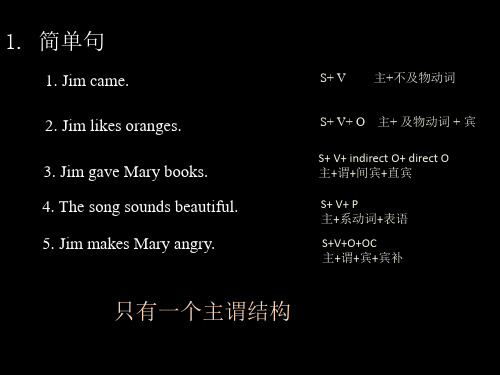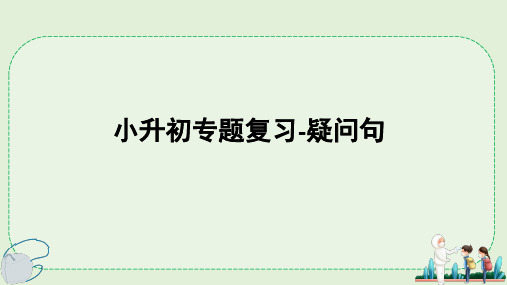疑问句(一般问句、特殊疑问句)公开课教学课件
合集下载
英语问句课件PPT

用词不当
总结词
用词不当是指句子中使用了不恰当的词汇, 导致语义不明确或语法错误。
详细描述
用词不当可能是由于对词汇含义理解不准确 或拼写错误造成的。例如,“I have a good imagination.”(我有一个很好的想 象力。)中,“good”应该替换为 “great”,因为“great”更能准确地表达 “很好的”含义。正确的表达应该是“I have a great imagination.”(我有一个很 好的想象力。)
英语问句课件
contents
目录
• 英语问句的种类 • 英语问句的构成要素 • 英语问句的语气和语调 • 英语问句的回答方式 • 英语问句的常见错误和纠正方法
01
英语问句的种类
一般疑问句
总结词
以Yes或No回答的疑问句
详细描述
一般疑问句通常以be动词、助动词或情态动词开头,询问事实或观点,要求对 方给予肯定或否定的回答。例如:“Is the Earth round?”(地球是圆的吗? )
ห้องสมุดไป่ตู้调语气
总结词
用于强调某个信息或观点
详细描述
强调语气通常使用降调,并在需要强调的词语或短语上加重语气。这种语气可以突出某个信息的重要性,引起听 者的注意。
委婉语气
总结词
用于表达柔和、礼貌或含蓄的询 问或请求
详细描述
委婉语气通常使用升调,语气较 为柔和,常用于请求或询问时, 以避免直接或强硬的表达。
谓语的位置通常紧跟在主语之 后,但也可以出现在其他位置 。
宾语
宾语是问句中的受事者,表示动 作或状态的对象。
宾语可以是名词、代词或名词短 语,如“What do you want?”中的“you”。
小学英语语法---一般疑问句和特殊疑问句ppt课件

可编辑课件
4
e.g
This is Amy's bike.(一般疑问句)
Is this Amy's bike?
Yes, this is. (肯定回答)错误
No, this isn‘t. (否定回答)错误
Did you go to Beijing last weekend?
Yes, I did. (肯定回答)
2、如句子里是动词就在这些词前加 don't,doesn't,didn't
(1)主语是第一、二人称(复数)加don’t,第三人称单数加
doesn't
(2)如果是过去式就加didn't
例:I like dogs.
She likes swimming.
I don‘t like dogs.
She doesn’t like swimming.
No, I didn't. (否定回答)
I have some books. (一般疑问句)
Do you have any b可o编辑o课件ks?
5
变否定句的做法:
1、如句子里是be动词:am,is,are,was,were 就在这些词后加 not
例: He is Tom.
He is not Tom.
( B) 25. ______ tea did you have?
Two cups. • How many B. How much C. How soon D. Which
可编辑课件
15
感谢亲观看此幻灯片,此课件部分内容来源于网络, 如有侵权请及时联系我们删除,谢谢配合!
感 谢 阅
读感
谢
一般疑问句和特殊疑问句的改法ppt课件

“雪亮工程"是以区(县)、乡(镇) 、村( 社区) 三级综 治中心 为指挥 平台、 以综治 信息化 为支撑 、以网 格化管 理为基 础、以 公共安 全视频 监控联 网应用 为重点 的“群 众性治 安防控 工程” 。
特殊疑问句
• 二、改特殊疑问句简单来说就 是针对原句中的不同内容用不 同的特殊疑问词来提问,特殊 疑问词就是:what, when, where, which, who, whose, how
• 特殊疑问词放句首,后面的句 型变化顺序同一般疑问句
“雪亮工程"是以区(县)、乡(镇) 、村( 社区) 三级综 治中心 为指挥 平台、 以综治 信息化 为支撑 、以网 格化管 理为基 础、以 公共安 全视频 监控联 网应用 为重点 的“群 众性治 安防控 工程” 。
Are you a teacher?
2.You are working. Are you 、乡(镇) 、村( 社区) 三级综 治中心 为指挥 平台、 以综治 信息化 为支撑 、以网 格化管 理为基 础、以 公共安 全视频 监控联 网应用 为重点 的“群 众性治 安防控 工程” 。
“雪亮工程"是以区(县)、乡(镇) 、村( 社区) 三级综 治中心 为指挥 平台、 以综治 信息化 为支撑 、以网 格化管 理为基 础、以 公共安 全视频 监控联 网应用 为重点 的“群 众性治 安防控 工程” 。
一般疑问句
• 1、原句的谓语动词是be动词(am, is, are, was, were...)或情态动词(can, may, could, will...),则将句中的be动词或情态动词提至句 前,句子其他部分的语序不变,标点变为问号. eg.1.You are a teacher.
• 2、原句的谓语动词是实义动词,则需根据原 句的主语借助助动词,原句中的动词用原型. eg.1.I like music. Do you like music?
一般疑问句 特殊疑问句讲解(共13张PPT)

肯定回答 否定回答
Yes, 主语 + 情/be/助动词 No, 主语 +情/be/助动词 + not
特殊疑问句
询问一些具体信息,如人或事,时间,地点,原因等。
事, 时间,地点,原因等。
特殊疑问句
特殊疑问词
一般疑问句 一找二提三变
特殊疑问词
谁的 whose 谁 who 物
年龄要用 How old
找-提-变
Does he has a lot of books?
Does he have a lot of books?
变一般疑问句步骤
迷之微笑
4. I went to school yesterday.
找-提-变
Did I go to school yesterday?
Did you go to school yesterday?
what
哪里 where 何时用 when 哪个 which 如何得用 how
为何 why what time
加人物 帮助
特殊疑问词
once a year, twice a week
once, twice, three times
how often I usually go to visit my grandpa three times a month.
特词换主抄原句,三单S给谓语
变 一般疑问句 Do you have a sister?
加 特殊疑问词 Who
去 掉划线部分 Who has a sister?
4. She played table tennis yesterday.. 变 一般疑问句 Did she play table tennis yesterday? 加 特殊疑问词 What
疑问句(一般疑问句、特殊疑问句)公开课教学课件

Try to complete the dialogue
• Millie: _W_h_e_n __are we going to Harbin?
• Mum: On 10th February. • Millie: _W_h_at___ is the weather like in Harbin at
➢ what----Activity or thing (对行为和事物提问)。
e.g . 1. “What are you talking about?” “你们在谈什么?” “We are talking about our family.” “我们在谈论我们 的家庭情况。”
2. “What is your name?” “你叫什么名字?” “My name is Wang Li.” “我叫王丽。”
How old is she?
3. Jim plays with his dog for about two hours on Sunday.
How long does Jim play with his dog on Sunday?
4. Millie goes to the Reading Club twice a week.
No, she is not./No, she isn`t. 2.Can you see a star?
Yes, I can.
No, I can not./No, I can`t.
3. Do you like English.
Yes, I do. No, I do not./No, I don`t.
Why are you going to buy moon cakes?
C Using ‘some’/ ‘any’
小升初专题复习-疑问句课件

按要求完成练习。 Is Betty a driver? Is Betty a nurse?(合并成一个选择疑问句)(河北石家 庄某重点中学招生卷) ________ Betty a driver ________ a nurse? 思路点拨:根据题目可知,所给两个句子是同主语的两个一般疑问句。 合并成一个选择疑问句结构为:一般疑问句+or+可选择部分?所以正 确答案为:Is Betty a driver or a nurse? 【答案】Is or
疑问词 意思 用法 疑问词 意思
用法
which 哪一个 询问选择 how much 多少 询问数量或价钱
why 为什么 询问原因 how old 多大 询问年龄
what 什么 询问东西 how tall 多高 询问身高
how 怎么样 询问方式 how heavy re you? —I'm 1. 55 meters. (贵州毕节某重点中学招生卷)
A. Yes, there is.
B. Yes, there are.
C. Yes, it is.
思路点拨:Are there开头的一般疑问句,有两种回答,一种肯定回答:
Yes, there are. 一种否定回答:No, there aren't. 故选B。
【答案】B
特殊疑问句 1. 以疑问代词what, who, whose, which或疑问副词when, where, how, why放在句首提问的句子,叫特殊疑问句。它的答句要针对句中的疑问 词回答,不能用yes或no来回答。特殊疑问句读降调。 2. 特殊疑问句的结构: (1) 疑问词(作主语)+谓语动词+其他?如:Who is drawing now?谁正 在画画? (2) 疑问词+一般疑问句?如:How do you go to work?你怎样去上班?
初中语法英语专题复习 一般疑问句和特殊疑问句(优质课件)
Does she like playing sports? What does she like?
4、The model plane is under the sofa.
Is the model plane under the sofa?
Where is the model plane? 5、Her favorite subject is history.
Is this an old jacket? What's this?
2、My schoolbag is black and white. Is your schoolbag black and white?
What color is your schoolbag? 3、She likes playing sports.
技巧1、主语为I/we,转化成一般疑问句时,I/We要变为you, my,our 变为your。
技巧2、句子中没有实义动词时,选Is/ Are,有实义动词时 选Can/Do/Does 技巧3、肯定回答:Yes, +主语(通常是代词主格)+v.
不能用缩写形式Yes,it’s(x); Yes,it is.(v) 否定回答:No, +主语(通常是代词主格)+ v not.(常缩写形式).但am与 not不缩写.如:— Are you a student
一般疑问句和特殊疑问
1.Is this your pencil ? --Yes, it is. / No, it isn’t.
2.Can y用ouYplEaySb或askNetbOal来l? --Yes, I c回an.答/ N的o,问I ca句n’t. 3.Do常you是lik一e p般layi疑ng 问spo句rts?。
4、The model plane is under the sofa.
Is the model plane under the sofa?
Where is the model plane? 5、Her favorite subject is history.
Is this an old jacket? What's this?
2、My schoolbag is black and white. Is your schoolbag black and white?
What color is your schoolbag? 3、She likes playing sports.
技巧1、主语为I/we,转化成一般疑问句时,I/We要变为you, my,our 变为your。
技巧2、句子中没有实义动词时,选Is/ Are,有实义动词时 选Can/Do/Does 技巧3、肯定回答:Yes, +主语(通常是代词主格)+v.
不能用缩写形式Yes,it’s(x); Yes,it is.(v) 否定回答:No, +主语(通常是代词主格)+ v not.(常缩写形式).但am与 not不缩写.如:— Are you a student
一般疑问句和特殊疑问
1.Is this your pencil ? --Yes, it is. / No, it isn’t.
2.Can y用ouYplEaySb或askNetbOal来l? --Yes, I c回an.答/ N的o,问I ca句n’t. 3.Do常you是lik一e p般layi疑ng 问spo句rts?。
《一般疑问句》课件
总结
• 一般疑问句用于向他人提问,通过主谓倒装和Yes/No回答。 • 特殊疑问句以特殊疑问词开头,用于询问特定信息。 • 通过练习掌握一般疑问句、Yes/No问答和特殊疑问句的使用。 • 巩固并应用一般疑问句,提高沟通表达能力。
《一般疑问句》PPT课件
一般疑问句PPT课件,让你轻松掌握一般疑问句的用法和技巧。增加课堂趣 味性,帮助学生更好地理解和运用一般疑问句。
什么是一般疑问句?
1 定义
2 重要性
一般疑问句是用于向对方提问的句型,通 过倒装询问陈述句的真实性或肯定/否定的 回答。
学习一般疑问句有助于提高语言表达能力, 使对话更加生动有趣。
一般疑问句的句型结构
1
基本句型
一般疑问句的基本句型是:助动词 +
主谓倒装
2
主语 + 谓语。
当主语为第三人称单数,或以非be动
词开头时,需要将主语和谓语进行倒
ห้องสมุดไป่ตู้装。
3
示例
一般疑问句的示例:Are you ready? Can he swim? Did they finish the project?
Yes/No问答
1 回答方式
Yes/No问答是对一般疑问句进行肯定或否定回答,可以直接简略回答或使用完整句子回 答。
2 缩略回答
缩略回答只使用动词和be动词“是”或“不是”的形式,如“Yes, I am.” 或“No, he isn't.”
特殊疑问句
1 定义
特殊疑问句是用于询问特定信息的句型,常以特殊疑问词开头。
2 句型结构
特殊疑问句的句型结构是:特殊疑问词 + 助动词(be动词) + 主语 + 谓语(其它动词)。
特殊疑问句(18张PPT)初中英语专项复习课件
5. —Whose bike is this? ( Mr. Smith ) —It’s Mr. Smith’s bike. —Mr. Smith’s.
特殊疑问句的答语
6. —Which bike do you like ? ( black ) —I like the black one. —The black one.
What did he buy yesterday? (疑问词+一般问句)
特殊疑词的用法
二、疑问副词 :when,where,why,how (1)when 什么时候、何时。在疑问句中主要时间状语,表语。
如: He will come back next week. (状语)
When will he come back ? (疑问词+一般问句) His birthday was October 1,1989. (表语)
特殊疑词的用法
一、疑问代词 :who,whom,whose,which,what (5)what 什么,通常指事物,也可询问人的职业或身份。在
疑问句中主要作主语,宾语,表语或定语。
如: He is a teacher. (表语)
What is he ? (疑问词+一般问句) A book is on the desk. (主语) What is on the desk?(语序不变) He bought a book yesterday. (宾语)
分 18. I can't go with you because I have to look after
进
my brother.
行 19. It will be snowy tomorrow.
提 20. The girls play basketball every day.
特殊疑问句的答语
6. —Which bike do you like ? ( black ) —I like the black one. —The black one.
What did he buy yesterday? (疑问词+一般问句)
特殊疑词的用法
二、疑问副词 :when,where,why,how (1)when 什么时候、何时。在疑问句中主要时间状语,表语。
如: He will come back next week. (状语)
When will he come back ? (疑问词+一般问句) His birthday was October 1,1989. (表语)
特殊疑词的用法
一、疑问代词 :who,whom,whose,which,what (5)what 什么,通常指事物,也可询问人的职业或身份。在
疑问句中主要作主语,宾语,表语或定语。
如: He is a teacher. (表语)
What is he ? (疑问词+一般问句) A book is on the desk. (主语) What is on the desk?(语序不变) He bought a book yesterday. (宾语)
分 18. I can't go with you because I have to look after
进
my brother.
行 19. It will be snowy tomorrow.
提 20. The girls play basketball every day.
一般疑问句和特殊疑问句课件
2.陈述句中有情态动词(can、 may、must …)时,可直接将 它们提至主语前,即可成为一般 疑问句.
He can swim now. → Can he swim now﹖
可编辑课件PPT
7
注意事项 陈述句变一般疑问句:
3.陈述句中只有一个实义动词作谓语。 当时态为一般现在时,变为一般疑问句时 要在句首加do或does, 主语后的实义动 词用原形。当时态为一般过去时,变为一 般疑问句时要在句首加did, 主语后的实 义动词用原形。如:
Did he go to Guangzhou yesterday?
可编辑课件PPT
9
特殊疑问句
以疑问词开头: what, who, whose, which, when, where, why, how, how many, how much, how old 等。 (1) Where are you from? (2) Who is he? (4) How many girls are there in your class? (5) Which film star do you like best?
一般疑问句和特殊疑问句
句子构成、回答形式和 声调
可编辑课件PPT
1
一般疑问句
一般疑问句是疑问句的一种。
定义: 它是指用yes(是)或no (否)来回答的句子。
可编辑课件PPT
2
一般疑问句
(1) Is Han Mei in Class Four? (2) Can you spell your name, please? (3) Does he go to school every day?
翻译练习
1. 你们喜欢英语吗?
2. 我真的需要这些规则吗?
He can swim now. → Can he swim now﹖
可编辑课件PPT
7
注意事项 陈述句变一般疑问句:
3.陈述句中只有一个实义动词作谓语。 当时态为一般现在时,变为一般疑问句时 要在句首加do或does, 主语后的实义动 词用原形。当时态为一般过去时,变为一 般疑问句时要在句首加did, 主语后的实 义动词用原形。如:
Did he go to Guangzhou yesterday?
可编辑课件PPT
9
特殊疑问句
以疑问词开头: what, who, whose, which, when, where, why, how, how many, how much, how old 等。 (1) Where are you from? (2) Who is he? (4) How many girls are there in your class? (5) Which film star do you like best?
一般疑问句和特殊疑问句
句子构成、回答形式和 声调
可编辑课件PPT
1
一般疑问句
一般疑问句是疑问句的一种。
定义: 它是指用yes(是)或no (否)来回答的句子。
可编辑课件PPT
2
一般疑问句
(1) Is Han Mei in Class Four? (2) Can you spell your name, please? (3) Does he go to school every day?
翻译练习
1. 你们喜欢英语吗?
2. 我真的需要这些规则吗?
- 1、下载文档前请自行甄别文档内容的完整性,平台不提供额外的编辑、内容补充、找答案等附加服务。
- 2、"仅部分预览"的文档,不可在线预览部分如存在完整性等问题,可反馈申请退款(可完整预览的文档不适用该条件!)。
- 3、如文档侵犯您的权益,请联系客服反馈,我们会尽快为您处理(人工客服工作时间:9:00-18:30)。
6.Tclhaesrse? is some bread on the plate.
How much bread is there on the
7.Mpliaktee?is 1.35 meters tall.
How tall is Mike?
8.I’ll bring it here in a minute.
“My name is Wang Li.” “我叫王丽。”
的家庭情
which----Thing or person (对特定的人或事物提问)。
e.g “Which man is your English teacher?” “哪位是你的英 语老师?”
“The man in white.” “那个穿着白衣服的。”
初中英语
一般疑问句 特殊疑问句 反意疑问句
一般疑问句
一般疑问句,即(yes/no)问句的改变: 1.把关键词(如:am、is、are、have、has、 can、
will等)放在句子的开头,句尾改为“?” 但要
注意一、二人称的转换。 2.有实意动词的句子改问句时,在句子开头加
1.She is a pupil. Is she a pupil?
Why are you going to buy moon cakes?
C Using ‘some’/ ‘any’
We use ‘some’ or ‘any’ to talk about the amount of something.
Question
Does he give you _a_n_y_ cakes?
who
----Person (对人提问)
e.g “Who will visit you tomorrow?” “My father.”
“明天谁来看你?” “我爸爸。”
whose----Possession (对人的所有关系提问) e.g “Whose book is this?” “It is my brother’s.”
她 是 学生。 是 她 学生 ?
2. I can see a star. Can you see a star?
3. My mother is a teacher. Is your mother a teacher?
4. It will rain this afternoon. Will it rain this afternoon?
Positive sentence
He gives me _s_o_m_e_ cakes.
Negative sentence offer Request
He doesn't give me __a_n_y cakes. Would you like _____socmaekes?
Can I have _s_o_m_e_ cakes?
Some some
some
some
some
反意疑问句
•又叫附加疑问句,是在一个陈述句后加上一 个简短的疑问句,表示对陈述句所叙述的事 实提出疑问、情况或看法,问对方同不同意
It looks like rain,
doesn’t it ?
陈述句
简短的疑问句
He doesn’t need to work so late, does he ?
1. I go to school by bus.
How do you go to school?
2. She is twelve.
How old is she?
3. Jim plays with his dog for about two hours on Sunday.
How long does Jim play with his dog on Sunday?
•
that time?
• Mum: It’s very cold.
• Millie: W_he_re___are we going to stay in Harbin?
• Mum: In Grandma’s big house.
• Millie: _Wh_at___does Grandma like eating?
• 3.Kitty is wearing a special costume.
Who is wearing a special costume?
• 4.I want a skateboard for Christmas.
What do you want for Christmas?
• 5.Daniel is in the kitchen.
any Sandy: Oh, that’s very kind of you! Do you have _____ milk? any Lucy: I’m sorry. I don’t have _____ milk.
Sandy: That’s all right.
some Tom: Tomorrow is Teacher’s Day. Did you buy _____ flowers for your teachers?
1. I like English. Do you like English?
2. Eddie played football. Did Eddie play football?
一般疑问句的肯定回答、否定回答。
肯定回答:Yes,… +关键词。 否定回答:No,…+关键词+not.
1.Is she a pupil? Yes, she is.
Tom: Could you buy ______ for me? I also need ______ but I am very busy today.
Susan: Ok, I will go there this afternoon because I also need ______ more.
I am reading. I’d like this red one. He is our teacher. The bag is mine. My birthday is on 2nd May. My pen is in the pencil case. I like dancing because it is fun.
Try to complete the dialogue
• Millie: _W_he_n___are we going to Harbin?
• Mum: On 10th February. • Millie: _W_ha_t ___ is the weather like in Harbin at
“In Shanghai.” “在上海。”
why-----reason (对原因提问) e.g “Why are you late?” “你为什么迟到?”
“Because I missed the bus.” “因为我没赶 上公共汽车。”
想想还缺了哪个疑问词呢?
Let’s see the family of “how”
4. Millie goes to the Reading Club twice a week.
How often does Millie go to the Reading Club?
5.There are more than forty students in our class.
How many students are there in your
Where is Daniel?
• 6.Weห้องสมุดไป่ตู้celebrate by giving presents.
How do we celebrate ?
• 7.My birthday is on 14th August.
When is your birthday?
• 8.I am going to buy moon cakes because the Mid-autumn Festival is coming.
反意疑问句的基本结构有两种:一是:肯定 陈述句+简短的否定问句 ;二是:否定陈述 句+简短的肯定问句。简称“前肯后否,前否 后肯。”
He is a teacher , isn’t he ?
She didn’t go to school , did she ?
反意疑问句的前后两部分在时态、人称和数上都要保持一致。
No, she is not./No, she 2.iCsann`ty.ou see a star?
Yes, I can.
No, I can not./No, I
3. Do you like EngYelsi,sIh.do.
No, I do not./No, I don`t.
4. Did Eddie play football?
what----Activity or thing (对行为和事物提问)。
e.g . 1. “What are you talking about?” “你们在谈什么?”
况。”
“We are talking about our family.” “我们在谈论我们
2. “What is your name?” “你叫什么名字?”
Yes, he did. No, he did not./No, he didn`t.
特殊疑问句
(Special question)
特殊疑问句的形式:疑问代词/副 词 + 动词 be/助动词/情态动词 + 主语 + 动词。疑问代词/副词包括 what, who, which, whom, whose, when, how, why, where 等。回 答时不用yes 或no,而要根据实际 情况回答。
How much bread is there on the
7.Mpliaktee?is 1.35 meters tall.
How tall is Mike?
8.I’ll bring it here in a minute.
“My name is Wang Li.” “我叫王丽。”
的家庭情
which----Thing or person (对特定的人或事物提问)。
e.g “Which man is your English teacher?” “哪位是你的英 语老师?”
“The man in white.” “那个穿着白衣服的。”
初中英语
一般疑问句 特殊疑问句 反意疑问句
一般疑问句
一般疑问句,即(yes/no)问句的改变: 1.把关键词(如:am、is、are、have、has、 can、
will等)放在句子的开头,句尾改为“?” 但要
注意一、二人称的转换。 2.有实意动词的句子改问句时,在句子开头加
1.She is a pupil. Is she a pupil?
Why are you going to buy moon cakes?
C Using ‘some’/ ‘any’
We use ‘some’ or ‘any’ to talk about the amount of something.
Question
Does he give you _a_n_y_ cakes?
who
----Person (对人提问)
e.g “Who will visit you tomorrow?” “My father.”
“明天谁来看你?” “我爸爸。”
whose----Possession (对人的所有关系提问) e.g “Whose book is this?” “It is my brother’s.”
她 是 学生。 是 她 学生 ?
2. I can see a star. Can you see a star?
3. My mother is a teacher. Is your mother a teacher?
4. It will rain this afternoon. Will it rain this afternoon?
Positive sentence
He gives me _s_o_m_e_ cakes.
Negative sentence offer Request
He doesn't give me __a_n_y cakes. Would you like _____socmaekes?
Can I have _s_o_m_e_ cakes?
Some some
some
some
some
反意疑问句
•又叫附加疑问句,是在一个陈述句后加上一 个简短的疑问句,表示对陈述句所叙述的事 实提出疑问、情况或看法,问对方同不同意
It looks like rain,
doesn’t it ?
陈述句
简短的疑问句
He doesn’t need to work so late, does he ?
1. I go to school by bus.
How do you go to school?
2. She is twelve.
How old is she?
3. Jim plays with his dog for about two hours on Sunday.
How long does Jim play with his dog on Sunday?
•
that time?
• Mum: It’s very cold.
• Millie: W_he_re___are we going to stay in Harbin?
• Mum: In Grandma’s big house.
• Millie: _Wh_at___does Grandma like eating?
• 3.Kitty is wearing a special costume.
Who is wearing a special costume?
• 4.I want a skateboard for Christmas.
What do you want for Christmas?
• 5.Daniel is in the kitchen.
any Sandy: Oh, that’s very kind of you! Do you have _____ milk? any Lucy: I’m sorry. I don’t have _____ milk.
Sandy: That’s all right.
some Tom: Tomorrow is Teacher’s Day. Did you buy _____ flowers for your teachers?
1. I like English. Do you like English?
2. Eddie played football. Did Eddie play football?
一般疑问句的肯定回答、否定回答。
肯定回答:Yes,… +关键词。 否定回答:No,…+关键词+not.
1.Is she a pupil? Yes, she is.
Tom: Could you buy ______ for me? I also need ______ but I am very busy today.
Susan: Ok, I will go there this afternoon because I also need ______ more.
I am reading. I’d like this red one. He is our teacher. The bag is mine. My birthday is on 2nd May. My pen is in the pencil case. I like dancing because it is fun.
Try to complete the dialogue
• Millie: _W_he_n___are we going to Harbin?
• Mum: On 10th February. • Millie: _W_ha_t ___ is the weather like in Harbin at
“In Shanghai.” “在上海。”
why-----reason (对原因提问) e.g “Why are you late?” “你为什么迟到?”
“Because I missed the bus.” “因为我没赶 上公共汽车。”
想想还缺了哪个疑问词呢?
Let’s see the family of “how”
4. Millie goes to the Reading Club twice a week.
How often does Millie go to the Reading Club?
5.There are more than forty students in our class.
How many students are there in your
Where is Daniel?
• 6.Weห้องสมุดไป่ตู้celebrate by giving presents.
How do we celebrate ?
• 7.My birthday is on 14th August.
When is your birthday?
• 8.I am going to buy moon cakes because the Mid-autumn Festival is coming.
反意疑问句的基本结构有两种:一是:肯定 陈述句+简短的否定问句 ;二是:否定陈述 句+简短的肯定问句。简称“前肯后否,前否 后肯。”
He is a teacher , isn’t he ?
She didn’t go to school , did she ?
反意疑问句的前后两部分在时态、人称和数上都要保持一致。
No, she is not./No, she 2.iCsann`ty.ou see a star?
Yes, I can.
No, I can not./No, I
3. Do you like EngYelsi,sIh.do.
No, I do not./No, I don`t.
4. Did Eddie play football?
what----Activity or thing (对行为和事物提问)。
e.g . 1. “What are you talking about?” “你们在谈什么?”
况。”
“We are talking about our family.” “我们在谈论我们
2. “What is your name?” “你叫什么名字?”
Yes, he did. No, he did not./No, he didn`t.
特殊疑问句
(Special question)
特殊疑问句的形式:疑问代词/副 词 + 动词 be/助动词/情态动词 + 主语 + 动词。疑问代词/副词包括 what, who, which, whom, whose, when, how, why, where 等。回 答时不用yes 或no,而要根据实际 情况回答。
